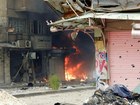The internationally-backed ceasefire in Syria is in a fragile state and the situation on the ground is not good, a spokesman for the plan's architect Kofi Annan said on Friday.
Ahmed Fawzi said there were new victims of violence every day.
 Full Story
Full Story
French Ambassador to Lebanon Denis Pietton denied on Friday that his country is considering to deploy troops along the northern Lebanese border.
“These reports aren’t based on facts and there’s no will to deploy French troops along the Lebanese northern border with Syria,” Pietton told reporters during a tour to the South.
 Full Story
Full Story
Syrian activists protested against President Bashar al-Assad on Friday, saying the embattled leader will be defeated, as at least 36 civilians and 13 pro-regime security personnel were killed in fresh violence.
The Local Coordination Committees, the main activist group spurring protests on the ground, said security forces killed 36 civilians across the country, including three children and two women.
 Full Story
Full Story
Russia said Friday a ceasefire was generally holding in Syria despite some violations and should be seen as an achievement that was saving the country from a broader civil war.
"Despite the existing violations and provocations, the ceasefire is holding overall. This is a great achievement whose loss could lead to a dangerous retreat to a new wave of violence," the foreign ministry said in a statement.
 Full Story
Full Story
United Nations Special Coordinator for Lebanon Derek Plumbly denied any plans to set up refugee camps for the Syrians in Lebanon, praising the Lebanese authorities’ commitment to the humanitarian needs of the displaced.
“The number of the Syrian refugees in Lebanon is increasing and I was impressed by the hospitable Lebanese residents along the border,” Plumbly said in an interview with An Nahar newspaper published on Friday.
 Full Story
Full Story
Israeli Defense Minister Ehud Barak said Hizbullah and other Iranian proxies would suffer if Syrian President Bashar Assad was overthrown.
"Assad's fall would be a major blow to Iran... it would weaken dramatically both Hizbullah in Lebanon and Hamas and Islamic Jihad in Gaza. It would be very positive," Barak told CNN on Thursday.
 Full Story
Full Story
World powers should push for tough United Nations sanctions against Syria in order to force Bashar al-Assad's regime to comply with a U.N. peace plan, Secretary of State Hillary Clinton said Thursday.
"We need to start moving very vigorously in the Security Council for a Chapter Seven sanctions resolution," Clinton told international envoys at talks in Paris.
 Full Story
Full Story
The rebel Free Syrian Army called for outside military intervention against the Damascus regime even without U.N. Security Council approval, in a video posted online on Thursday.
General Mustafa Ahmed al-Sheikh, who heads the SLA military council, charged that the government, unlike rebel fighters had failed to respect a ceasefire deal agreed with U.N.-Arab League mediator Kofi Annan.
 Full Story
Full Story
A coalition of Western and Middle East powers warned on Thursday that they would seek tougher international action if Bashar al-Assad's Syrian regime continues to flout a shaky U.N. peace plan.
Senior officials, including U.S. Secretary of State Hillary Clinton and French Foreign Minister Alain Juppe, accused Assad of breaking the ceasefire and said a U.N. observer mission would have to be dramatically reinforced.
 Full Story
Full Story
Fresh violence raged across Syria on Thursday even as authorities in Damascus penned an agreement aimed at putting a stop to 13 months of bloodshed.
The Britain-based Syrian Observatory for Human Rights said security forces killed four civilians across the country, but the Local Coordination Committees, the main activist group spurring protests on the ground, reported a higher death toll.
 Full Story
Full Story



